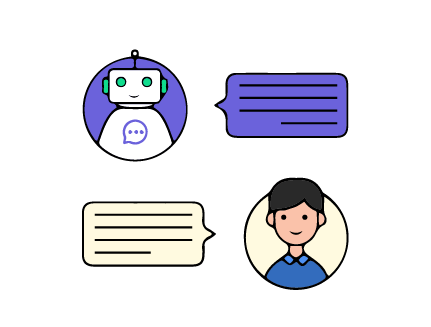Boost Your Business Sales with Our Smart Chatbot
Automate responses and engage customers instantly.
Start your 7-day free trial today!
- Quick Response
- Boost Conversion Rates
- Automate Sales Process
Best AI ChatBot for

Business

e-Commerce

etail

e-Learning
The Role of AI ChatBot for Business Automation and Growth
Artificial Intelligence (AI) is revolutionizing businesses by making them more efficient, saving money, and enhancing competitiveness. AI can analyze data, predict trends, and assist in planning, marketing, and managing resources. It automates routine tasks, allowing employees to focus on creative work, and improves customer service through tools like chatbots and voice assistants.
In marketing, AI personalizes campaigns and predicts customer preferences, leading to better sales. In finance, it automates accounting, detects fraud, and optimizes investments. AI also helps manage employees by offering tailored training programs, streamlining hiring, and tracking productivity.
Logistics and supply chains benefit from AI too, as it predicts resource needs, finds efficient delivery routes, and reduces costs. Across industries, AI boosts adaptability and customer satisfaction, making it an invaluable tool for modern businesses.
Essential Tools to Develop a Successful Business ChatBot
AI-Powered Automation
Streamline client interactions by automating responses and appointment scheduling.
Seamless Data Integration
Connect with EHR and CRM systems to manage client information efficiently.
Lead Qualification
Identify and prioritise potential clients based on their inquiries and needs.
Transforming Business Operations with Crowdy Chatbot
The Crowdy chatbot revolutionizes business by automating processes, enhancing customer service, and boosting operational efficiency. It handles customer queries 24/7, offers tailored recommendations, and reduces agent workload while improving customer satisfaction and conversion rates.
Crowdy collects and analyzes user data, enabling businesses to refine marketing strategies and improve sales. It automates order processing, tracks deliveries, and reduces abandoned sales by resolving customer issues in real-time. Additionally, it streamlines internal tasks like managing schedules, training staff, and retrieving information.
With multilingual capabilities in over 30 languages, Crowdy is ideal for global businesses, helping them reduce costs, speed up processes, and stay competitive in the digital age.
Advantages and functionalities of Crowdy ChatBot

Customisable Customer Interaction

Advanced AI-Powered Responses

Seamless CRM Integration

24/7 Availability

Data-Driven Insights & Analytics
Why is it Profitable to Use AI Chatbots in the Business Industry?
The business industry operates in a competitive environment where companies must continually look for ways to enhance customer engagement, boost conversion rates, and stay ahead of the competition. Slow responses to customer inquiries can lead to lost opportunities and decreased sales. Implementing a chatbot on a company’s website provides a strategic solution to automate customer interactions, reduce response times, and improve conversion rates.
| Benefit | Description |
|---|---|
| Increase in Website Conversion | Chatbots that simulate live communication and respond instantly in the customer’s language enhance user engagement. By providing immediate responses to inquiries, chatbots increase the chances of turning potential customers into actual buyers. Quick and efficient responses build trust and reflect high customer service standards, which are vital in today’s fast-paced business landscape. |
| Optimisation of Lead Qualification | Chatbots can collect valuable customer data, ask key questions, and qualify leads automatically. By efficiently identifying high-potential prospects, the chatbot ensures that sales teams focus on the most promising leads, improving conversion rates and overall sales performance. |
| Competitive Advantage | In an oversaturated market, the ability to respond quickly to customer inquiries can be a deciding factor in securing a sale. Chatbots provide instant responses, giving your business a competitive edge by addressing customers’ needs faster than competitors. |
| Reduction of Sales Team Workload | By automating routine customer interactions, chatbots free up your sales team to focus on more complex tasks, such as nurturing leads and closing deals. Chatbots can efficiently handle common inquiries about products, services, availability, and pricing, improving team productivity and operational efficiency. |
| Multilingual Support | Crowdy’s chatbots offer multilingual support, engaging with customers in over 30 languages. This functionality enables businesses to reach a global customer base more effectively, ensuring clear communication and enhancing the experience for international clients and partners. |
Why is Crowdy Chatbot the best solution for businesses?
Crowdy’s chatbot is a game-changer for businesses, providing an efficient solution for automating customer interactions, improving lead qualification and increasing conversion rates. Custom-built to streamline workflows and improve customer engagement, the Crowdy chatbot is designed to support business growth and increase customer satisfaction. Crowdy’s chatbot provides 24/7 communication with potential customers, ensuring they receive instant answers to questions about products, services, pricing, availability and terms. This reduces the workload on business teams, allowing them to focus on high-value tasks while maintaining an always-on presence for customer queries. By addressing frequently asked questions – such as product details, delivery times, payment methods and discounts – the Crowdy chatbot handles routine enquiries quickly and efficiently, freeing agents to focus on more complex challenges. The chatbot also automates lead follow-up, sending reminders, confirming appointments, and nurturing prospects with personalised offers. This automation helps improve lead conversion rates and shorten business cycles, ensuring that no lead is overlooked. Seamlessly integrated with CRM and payment systems, Crowdy helps businesses track leads, monitor stages in the sales process and facilitate payments. Customers can easily make purchases or sign contracts directly through the chatbot, improving the user experience and reducing shopping cart abandonment rates. Crowdy’s chatbot excels at managing business pipelines by automatically qualifying leads based on customer behaviour and interactions. It routes high-potential leads to the right team members, enabling businesses to prioritise and close deals faster. By automating tasks such as scheduling appointments, capturing customer data and providing product recommendations, Crowdy frees agents to focus on providing personalised service, building relationships and closing deals.
Key Benefits of Crowdy AI Chatbots in Business:
- Instant Customer Support: AI chatbots provide immediate responses to client inquiries about products, services, pricing, availability, and payment options, significantly improving customer satisfaction and engagement.
- Automated Business Assistance: Chatbots can guide customers through service selection, offer personalized recommendations, and explain special promotions, minimizing manual effort and enhancing conversion rates.
- 24/7 Availability and Query Handling: AI chatbots can efficiently handle routine queries, assist with service details, and direct more complex cases to human representatives, ensuring a seamless experience for customers at all times.
- Seamless Appointment & Reminder System: AI-powered chatbots can schedule meetings, send reminders for important events or deadlines, and alert customers about offers, enhancing business activities and minimizing missed opportunities.
Challenges of AI Chatbots in Business:
- Data Security: Safeguarding customer data, including payment information and personal details, is crucial. Business chatbots must comply with data protection laws (e.g., GDPR, CCPA) to ensure customer privacy and build trust.
- Regulatory Compliance: AI chatbots in business services must adhere to local laws and regulations, ensuring that all recommendations, pricing, and promotions are legally compliant to avoid potential legal issues.
- Complex Business Queries: While AI chatbots efficiently handle routine inquiries, complex business negotiations, pricing structures, and customized solutions still require human expertise for optimal outcomes.
Compatible Platforms










The Role of AI in Business Automation and Growth
At Crowdy.ai, we’re not just building innovative chatbot solutions — we’re building a community around smart customer engagement, automation, and the future of AI in business. As a forward-thinking company, we believe that transparency, education, and constant communication with our clients are essential to long-term success. That’s why we maintain an active online presence across platforms like YouTube, Instagram, LinkedIn, and other social media channels. Our goal is to keep you informed, inspired, and equipped to take full advantage of the latest advancements in artificial intelligence. By subscribing to our channels, you gain access to a stream of relevant, easy-to-understand content that can help you make smarter decisions, improve customer communication.



